日本语文法电子版
- 格式:xls
- 大小:1.09 MB
- 文档页数:2
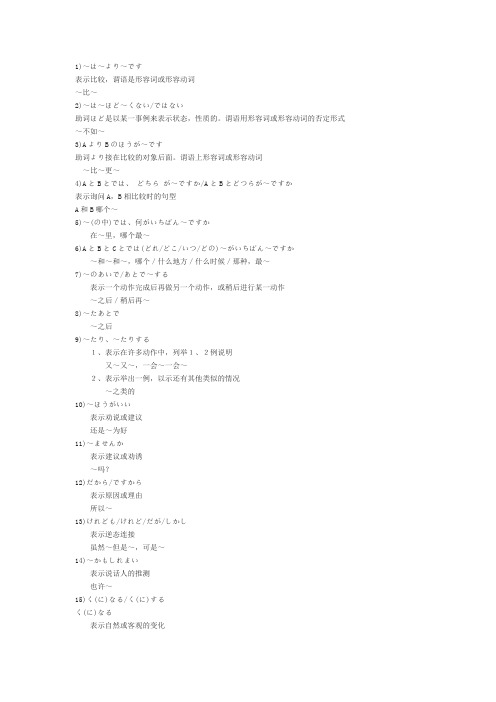
1)~は~より~です表示比较,谓语是形容词或形容动词~比~2)~は~ほど~くない/ではない助词ほど是以某一事例来表示状态,性质的。
谓语用形容词或形容动词的否定形式~不如~3)AよりBのほうが~です助词より接在比较的对象后面。
谓语上形容词或形容动词~比~更~4)AとBとでは、どちらが~ですか/AとBとどつらが~ですか表示询问A,B相比较时的句型A和B哪个~5)~(の中)では、何がいちばん~ですか在~里,哪个最~6)AとBとCとでは(どれ/どこ/いつ/どの)~がいちばん~ですか~和~和~,哪个/什么地方/什么时候/那种,最~7)~のあいで/あとで~する表示一个动作完成后再做另一个动作,或稍后进行某一动作~之后/稍后再~8)~たあとで~之后9)~たり、~たりする1、表示在许多动作中,列举1、2例说明又~又~,一会~一会~2、表示举出一例,以示还有其他类似的情况~之类的10)~ほうがいい表示劝说或建议还是~为好11)~ませんか表示建议或劝诱~吗?12)だから/ですから表示原因或理由所以~13)けれども/けれど/だが/しかし表示逆态连接虽然~但是~,可是~14)~かもしれまい表示说话人的推测也许~15)く(に)なる/く(に)するく(に)なる表示自然或客观的变化变的~,会变~く(に)する表示主观作用于某事物而使其发生变化把~弄成~,使~成为~16)~さ/~み使形容词或形容动词名词化17)ください一般用于请或要求对方做某事请给我~18)て型略19)ばかり1、表示数量次数特别多尽~,只~2、表示反复连续做某事,几乎不做其他事尽~,光~3、表示大概的数量~左右20)动词连用型て+から/动词过去式た+あとで表示一个动作之后,在进行另一个动作21)~てみる表示对某种动作的尝试~以下,~看22)~てしまう表示完了尽了,或者表示意外无可挽回的遗憾心情~完了,~光了,~了23)~ておく表示预先作好某种准备,后者表示继续保持某种状态,放任不管~预先,让它~24)~てほしい/~てもらいたい表示想请对方为我或我方做某事请(你)~25)~てくる1、表示主体在说话人的视线中,从远往近移动~过来2、表示某种变化已经开始了~起来了26)~ていく1、主体在说话人的实现中从近往远移动~去了2、表示某物渐渐的向某种方向变化趋于~27)たとえ~ても表示让步的表达形式即使~也~28)~てもいい表示许可可以~29)~てはいけない表示禁止不可以~,不准~30) どんなに~ても(でも)表示无论怎么样的情况,结果都如此无论怎么~都~,无论怎么~也~31)いくら~ても(でも)和30)相同无论怎么~都~32)~やすい/~にくい表示容易和难容易~,好~;难~,不容易~33)~かた(方)表示方法~法34)~だす表示动作的开始开始~,~起来35)~すぎる表示过度、过分过于~36)~ながら表示一个人同时做两件事边~边~,一面~一面~37)~しかない1、表示仅此而已只有~,仅~2、表示别无他法只能~38)~おかげで表示因为此原因而带来好结果的感谢的心情多亏~39)授受动词やる/あげる/差し上げる、もらう/いただく、くれる/くださる40)~ため(に)1、表示目的为了~2、表示原因因为~所以~表示有做某事的意志后打算打算~42)~まま表示保持着原来的状态。

日本語古典文法目次一、活用型1 四段活用2 上二段活用3 下二段活用4 ラ行変格活用5 ナ行変格活用二、助動詞1 ぬ2 む3 なむ4 らむ5 り6 き7 けり8 つ9 しめる⇒使役10 る・れる⇒受身11 らる・られる⇒受身12 ゆ⇒受身13 らゆ⇒受身14 なり15 たり・116 たり・2正文一、活用型【四段活用】動詞活用の型の一つ。
たとえば「書く」が、「書か・書き・書く・書け」のように変化するなど、その語形変化が主として語の最終音節の母音交替によって行われるもの。
その変化が五十音図の一行でア・イ・ウ・エの四段にわたるところからの名称。
ただし、已然形と命令形の語尾は同じエ段の音であるが、カ行・ハ行・マ行に活用するものは、上代ではエ段の甲乙両類に分かれていた。
連用形には、音便形がある。
この型に属する語は、文語では、全動詞中の六割に達するといわれ、活用はカ・ガ・サ・タ・ハ・バ・マ・ラの各行にわたる。
口語では、ラ変、ナ変の動詞がこれに併合され、現代かなづかいでは、助動詞「う」の付いた形を「書こう・読もう」のように書くので、見かけ上、オ段にもわたるとして、「五段活用」ともいう。
【上二段活用】文語動詞の活用の型の一つ。
未然・連用形の語尾がイ段、終止・連体・已然形はウ段で、連体形は「る」、已然形は「れ」を添える。
五十音図のイ段、ウ段の二段に活用するので、ウ段、エ段に活用する下二段活用に対していう。
「起く」(き、き、く、くる、くれ、きよ)など。
【下二段活用】文語動詞の活用の型の一つ。
二段活用のうち、未然・連用形と終止形の活用語尾が、五十音図のエ段とウ段の二段に変化するもの。
他の活用形では、連体・已然形は、ウ段にそれぞれ「る」「れ」が加えられ、命令形では、エ段に「よ」が加えられる。
この型に属する動詞は、四段活用についで数が多く、活用の行としては、五十音図のすべての行に例がある。
「得(う)」「寝(ぬ)」「経(ふ)」のように、語幹と活用語尾とを音節として分けられないものもある。


日语基础语法(完整篇)日语基础语法(完整篇)动词篇一.动词连用形1变化规则①五段动词:a:动词词尾变成其所在行的い段字。
(又称连用形1)b:在后接「て、ても、ては、た、たら、たり」时,五段动词的连用形发生音变浊化(又称连用形2)。
②一段动词:去掉动词词尾中的る(同未然形)。
③サ变动词:する变成し。
する==し。
勉強する==勉強し。
④カ变动词:くる变成き。
来る(くる)==き2 各种实用例A连用法:a,连用形+始まる、続ける、終わる等构成复合动词。
①読みかけた本の頁に印をつける。
“在读了一部分的书页上作记号。
”②食べおわったら片付けてください。
“吃完了后给收拾一下。
”③勉強し続けるためには丈夫な体が必要です。
“为了继续学习,需要健康的身体。
”④来遅れたら待ちませんよ。
“来晚了,我可不等你呀。
”b,连用形+やすい、にくい等来构成复合形容词。
①この万年筆は書きやすいです。
“这只钢笔很好写。
”②この服はとても格好がいいが、非常に着にくい。
“这件衣服很时髦,但是很不好穿。
”③ この部分は把握しやすい内容だ。
“这一部分是很容易掌握的内容。
”④ここはなかなか来にくい場所である。
“这里是很不容易来的地方。
”c,动词连用形2+て+(狭义的)补助动词。
①兄は今本を読んでいます。
“哥哥现在正在读书。
”②美味しいので、全部食べてしまいました。
“因为好吃,所以全部吃光了。
”③友達が来るから、部屋を掃除しておきました。
“因为朋友要来,所以我把房间收拾干净了。
”④ここへ来てみてはじめて此所の立派さに驚いた。
“来到这里,才知道这里的壮观程度。
”d, 连用形+名词构成复合名词。
①読み物はたくさんあるけれど、本当に読んだのはそれほど無い。
“书很多,但是真正读过的,没有几本。
”②忘れ物をしないように気を付けてください。
“请注意,不要忘掉东西。
”B,中顿法:连用形。
a,用于连接2个单句,使之变成一个并列句。
①雨が降り、風も吹いている。
“又下雨,又刮风。


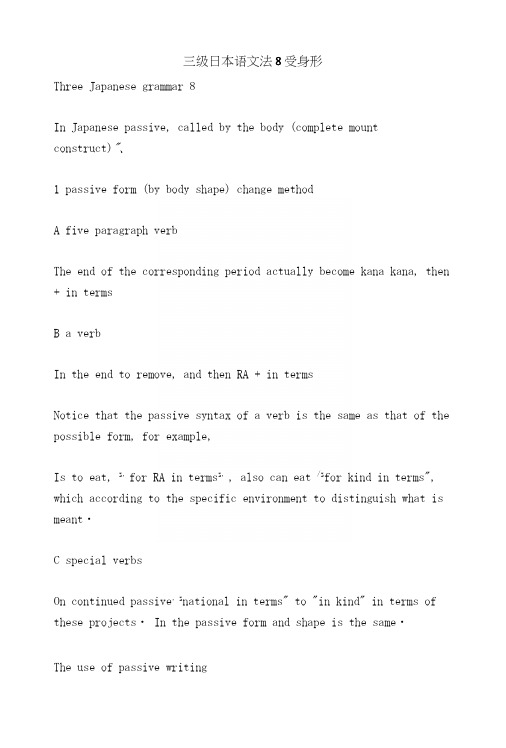
三级日本语文法8受身形Three Japanese grammar 8In Japanese passive, called by the body (complete mount construct)"、1 passive form (by body shape) change methodA five paragraph verbThe end of the corresponding period actually become kana kana, then + in termsB a verbIn the end to remove, and then RA + in termsNotice that the passive syntax of a verb is the same as that of the possible form, for example,Is to eat, z,for RA in terms z,, also can eat /z for kind in terms", which according to the specific environment to distinguish what is meant・C special verbsOn continued passive,z national in terms" to "in kind" in terms of these projects・ In the passive form and shape is the same・The use of passive writingThe first kind of passive text is the use of the target language (object) of the affirmative sentence as the subject・In a passive sentence, a person must be behind the action bypart icle 〃Ni〃,this is the fixed usage, must keep in mind・It is my own "woman: 7 guys for in and with in" automatic word, no target, things in their own action.And I said ''morning the cat cried" is "the woman is actually guys for national language or language and I ne〃,and "I" was his target verb, have 〃ne〃was the front, behind the target language with the auxiliary word "0〃The target language in Japanese is what we call the object・He is in front of the verb object, with the word 〃0〃The automatic word sometimes target, behind the target language to use 〃Ni〃. Such as automatic word (on line),Say "go shopping", that is to buy things the purpose of language, but not the and 〃Ni〃must be used・"As of last in line" on the moo"Passive text 2〃Secondly, there is more than one thing in the passive text"Use the third method when it is not necessary to point out who sent the action.In this case, there is no need to point out, so there is no action made by "people" in the sentence・But in some cases, the special mood is something that someone does, and in another way.4, the emphasis is to deliver the newspaper every day the students to work, then the expression method is a "person in the〃flying byIn a passive sentence, the action made by "person or thing" must be followed by the "special emphasis on things or people"to use 〃in the" flying by"Passive text 4〃In Japanese, there is a special way to express people,s feelings, which is to express ,,unwilling,/ or "unhappy" by means ofpassivity・Example 1, in fact, "falling rain" is not smooth, but this sentence is not a general indicative mood, but expressing a very troublesome and anxious mood・When translating a sentence like this, you can,t translate it hardExample 1 can be translated as 〃it's raining, it's troublesome. 〃・"Some verbs have no passive forms, so pay attention to them・Add "change method and use the passive form,z here・A passive, is being asked to do ~ "When said "passive" causative may not be easy to understand what timez,It,s hard to sing, " OK said, forcing two songs on the card Remember,All is the causative passive form 〃in the" in "estate" removed, plus "kind in terms"For example, the song 〃U〃into "Song estate in causative guys" into "Song causative passive is kind of guys estate in terms・The five section of the causative verb passive can directly into the "national" in termsAs for Ka RA 二for estate in terms as national in terms"I am forced to take medicine" is "on this or I ~ in terms of nationa1."But in at the end of the five verbs can,t change・Such as: "to have a kind of national estate in terms" cannot become 〃wa - National National RA in terms・〃1・"of this form by PartyA.five paragraph verbSay u?????? u guys, guys, words + in terms in termsDrink better?????? ~ + 二better, in terms of drinking in terms of MaAs in?????? - in RA + 二for RA in terms in termsB. a verbIn the?????? x + in RA 二RA in terms in terms・The food in?????? x 二in + RA in terms of food kind in termsC.change and change the form of verb verb sytecOn continued to national in termsCome in, come kind in terms (to RA in terms)Body shape exerciseIn the beginning of 1. will (is will start in), I will make u(in terms of 2. kind of feeling, to make u guys in terms)In the 3. Education (for the nursing education in the RA), in terms of 4. (on the paint on the smell, smell, in terms)5. never will (in), in terms of6. kind of will never call (), immediate call speech in termsThe 7. built in () to build the kind in terms of 8. sent in (and on in) to send kind in termsAfter the 9. to come in, but after holding to RA in terms of 10. questions on continued to question national in terms"Subject to Article 1〃A, B group, B < wa on continued A in stature by ~ "1."mother, or for will:,zFor a mother to child in as kind of terms for?2."Friends of nursing, or Treat Hyperplastic UTI private〃To a friend in private nursing national terms for UTI served?3.〃the president, Yamada San has called on importanceYamada San WA, president in speech calling for terms?Practice1."mother is in 7 when in private or in advance・ Since Mahyperplastic" in the body: "the cross from twenty million birds twenty million birds'" in Japanese?A): 7 in the female in private or from the national language terms ~ hyperplastic?B): 7 in private at play with mother in terms of Ma RA hyperplastic?C): 7 in private towards the mother was up in national terms 〜hyperplastic?Answer C"Subject to Article 2〃"The people of ~ or.A, B of X (object) or on continued toB: A: X < > (object) or by the body to.1.years of private, "he has heard ICDRG:〃He is in private, or smell, that made me cry for years?2."male man, and of private gold or and after/'To a man in a private man and gold group and RA TA terms?3.: 〃\任、.private or:〃as of writingIs Mr. in writing or to private will kind of terms for?Practice2."sister, in Tokyo, or private, fierce drink on the importance of the body:pedestrians to cross from twenty million birds 〃in Japanese?A) in Tokyo, a private or sister is fierce drink ~ terms for?B is a private, Tokyo), sister in fierce drink ~ terms for?C) is fierce, or private, sister in Tokyo ~ terms for drink?3., 〃the father of both private or will:in the body: 〃twenty million birds - twenty million birds?" in Japanese?A): Father in both private or as kind of terms for?Father: B)My picture was praised?C father praised? PictureThe answer C A 2・ 3.3〃passive sentences1.The newspaper is delivered at 6 o J clock every day.In this factory made for TV and video.3.English is spoken all over the world・「〜 (especially when people say ' I want to.4.The paper 6 at the time of part-time job students by delivery. PracticePlans to build a new building 4.90 flailing. A. IBN by B. IBN C IBN company from company. 〃4〃passive sentences〃You〃〃no,〃and the meaning of the sentence.1. The rain fel 1.I was puzzled・To have been caught in the rain.In the south, there stands a high building.The trouble is that the room is dark.Building, built in the south, and the room is dark.When friends came home last night・ Until three o'clock in the morning・ And drank a lot of wine・Come to my friend last night, until three in the morning・ Then, drink a lot of wine.can be heard m the passive form of the verb.* I can,t study very well, friends is good, shame・Good friends have a good test, I could very well become embarrassed.Causative passive form * *Anyway, many people said, "when you use?Example: the poor, the song was sung by the karaoke・To eat, eat to beLet go-go - line can be madeCome come come to to make・To cause to do.Causative passive form of the verb forms easilyIs going to go;Sing a song together;However, after the verb 〃to〃do not use this form?* * to talkIs a form of Japanese grammar exercises three class 8 passive A problem・I have no one to the police function.A. B and C in D at2.Sub・一一everyone loved the child.A. B in D in C・3.This is a novel written by Kenzaburo Oe.In A B. C from D by4.The only by my father yesterday.A toB in D of C.5.To hear the teacher address is.A toB C. When the D6.I have been flailing.In A. B invited. C invite. D invited to invite7.The workers are flailing in? SalariesA. B. Reduce the decrease in C let down D is reduced. And when I am busy Secretary flailing, very much puzzled? Dorf t be A B rest rest rest. C. D is rest.September song -- the person next to meI was embarrassed? FunctionA. B. Listen. Listen and hear C D hearing.10. He is saddened by his wife? FlailingA. As B made in C die die die as D.11. The lonely friends when I was? FlailingA. Come on in. C B coming coming coming D.Seminar on teacher? Flailing. Sub. 一一LaboratoryA called and called theB scolded scolded meIn C call me, call me at D scolded13. Don,t play? Flailing, testIn A as that is not B as C D. There is not soThe answer C12345BDBAD678910DCAC11 12 13C A CB problem・The passive sentence is cats eat rats lailing flailing・Sub. --?Cats eat rats・ A wasB. Cats eat rats madeCats eat rats・ C was"Passive" 2. Young people to read the manga "flailing flailing flailing?A is young people to read the comicsB is read from the young man comicsC is read manga young peopleJapanese passive sentences, 3 brother "、 " elder brother broke the flailing flailing flailing “?The elder brother younger brother A broken radioB. Let my brother to brother broken radioThe radio C elder brother younger brother trashedThere are 4 cop "passive" my "'flailing flailing flailing?A to police officers examined my luggageB. Let my luggage was investigated in a police officerC to police officers examined my luggagePassive sentence is 〃5 news broadcast on TV", "flailing flailing flai ling?But A news broadcast on TVBut B TV broadcast newsBut C news broadcast on TV people6 〃is the use of my company,s S word processor" passive,z f lai ling f lai ling flailing?A as my company is used S of word processorB will S of word processor used in our companyYou C to S of word processor used in our company"The passive sentences of the Spanish to Japanese Christianity" flailing flailing flailing?The A Christian Spanish to be transmittedThe B Christian Spanish by itThe C Christian Spanish handed down in Japan8 to station passive sentences "poster" flailing flailing flailing 〃?A poster in the field by the people・B as main station PosterAs C station poster swellThe answer C12345CACA678ABBOn the ,语中cry of)」,by passive "in JapanOne of the 动形passive method of study 变化A五段动词BA inThe tail of the kana into the corresponding segment actually kana, then + in termsB a verbIn the end to remove, and then RA + in termsNotice that the passive syntax of a verb is the same as that of the possible form, for example,Is to eat, "for RA in terms", also can eat "for kind in terms7', which according to the specific environment to distinguish what is meant・C special verbsOn continued passive "'national in terms'' to "in kind" in terms of these projects・ In the passive form and shape is the same・The use of passive writing"Passive text 1〃The first kind of passive text is the use of the target language (object) of the affirmative sentence as the subject・In a passive sentence, a person must be behind the action by particle 〃Ni〃,this is the fixed usage, must keep in mind・It is my ownwoman: 7 guys for in and with in" automatic word, no target, things in their own action.And I said ''morning the cat cried" is 〃the woman is actually guys for national language or language and I ne〃,and was his target verb, have was the front, behind the target language with the auxiliary word "0〃The target language in Japanese is what we call the object・He is in front of the verb object, with the word 〃0〃The automatic word sometimes target, behind the target language to use 〃Ni〃・Such as automatic word "go" (on line),Say 〃go shopping", that is to buy things 〃to〃the purpose of language, but not the and 〃Ni〃must be used・"As of last in line" on the moo"Passive text 2〃Secondly, there is more than one thing in the passive text""Passive text 3〃Use the third method when it is not necessary to point out who sent the action.In this case, there is no need to point out, so there is no action made by "people" in the sentence・But in some cases, the special mood is something that someone does, dnd in another way.4, the emphasis is to deliver the newspaper every day the students to work, then the expression method is a "person in the" flying byIn a passive sentence, the action made by "person or thing" must be followed by 〃Ni〃,the "special emphasis on things or people" to use "in the〃flying by"Passive text 4〃In Japanese, there is a special way to express people,s feelings, which is to express ,,unwilling,/ or "unhappy" by means of passivity.Example 1, in fact, "'falling rain,z is not smooth, but this sentence is not a general indicative mood, but expressing a very troublesome and anxious mood.When translating a sentence like this, you can,t translate it hardExample 1 can be translated as ,,it,s raining, it,s troublesome ・〃・"Some verbs have no passive forms, so pay attention to them・Add "change method and use the passive form,z here・When said "passive" causative may not be easy to understand what time〃It's hard to sing," OK said, forcing two songs on the cardRemember, all is the causative passive form 〃in the" in "estate" removed, plus "kind in terms''For example, the song into,z Song estate in causative guys・Change to the causative passive is 〃song〃kind of guys estate in termsThe five section of the causative verb passive can directly into the "national" in termsAs for Ka RA 二for estate in terms as national in terms"I am forced to take medicine" is 〃on this or I in terms of nationa1."But in at the end of the five verbs can,t change・Such as: 〃to have a kind of national estate in terms" cannot become 〃wa - National National RA in terms・。

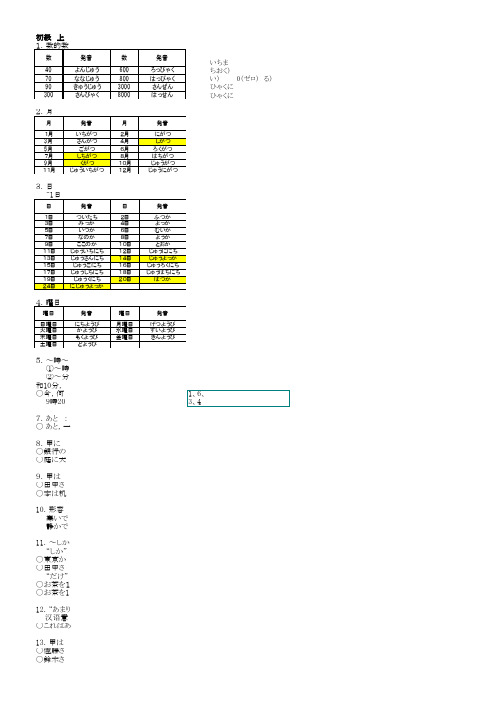
初級 上10000(いちまん)1億(いちおく)零(れい)0(ゼロ)丸(まる)202-にひゃくに220-にひゃくにじゅう3.日5.~時~分 ①~時 4点, 7点, 9点分别为“よじ”“しちじ”“くじ”。
②~分 根据前接的数字,“分”的发音为“ふん” 或“ぷん”。
暂时记住5分,15分…55分的“ごふん”“~ごふん”〇今,何時ですか。
9時20分です。
7.あと : 表示所剩,未尽的部分。
〇 あと,一週間です。
8.甲に 乙が ある/いる〇銀行の隣に郵便局があります。
〇庭に犬がいます。
9.甲は 乙に ある/いる〇田中さんは郵便局にいます。
〇本は机の上にあります。
10.形容词,形容动词过去式的用法 寒いです 寒かったです 寒くないです 寒くなかったです 静かです 静かでした 静かではありません 静かではありませんでした11.~しか …ません “しか”是助词,与后面的否定形式相呼应,汉语意思是“只~”“仅~”等。
〇東京から京都まで約2時間半しかかかりません。
〇田中さんしか来ませんでした。
“だけ”接在表示较少数量此后,同“~しか …ません”。
〇お茶を1杯だけ 飲みます。
〇お茶を1杯しか 飲みません。
12.“あまり …ません”汉语意思是“不太…”“不怎么…”〇これはあまり有名なお寺ではありません。
13.甲は 乙が …です〇佐藤さんは野球が上手です。
〇鈴木さんはテニスが好きではありません。
14.甲は (~で) 人気が ある 表示某人有人缘,受欢迎。
〇 この花は人気があります。
〇順子さんは学校で人気があります。
15.甲は 乙より …です “甲比乙……”〇中国は日本より広いです。
16.甲は 乙ほど …く ないです/ではありません “甲不如乙~”〇今日は昨日ほど暑くないです。
17.(乙より) 甲の ほうが …です 意思为“甲比乙~”,“和乙相比,甲~”,只是甲乙的顺序相反。
〇日本より中国のほうが広いです。
18.甲と 乙と どちらが …ですか 或 どれ/どこ/いつ/どの ~が いちばん …ですか〇日本と中国とどちらが広いですか。
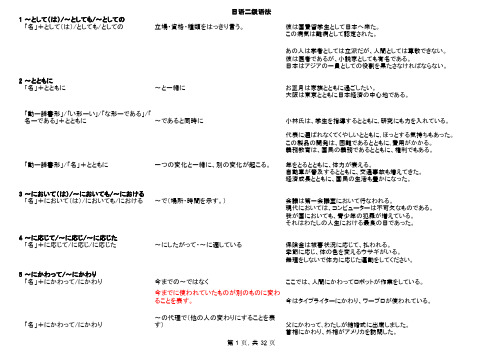
1~として(は)/~としても/~としての「名」+として(は)/としても/としての立場・資格・種類をはっきり言う。
彼は国費留学生として日本へ来た。
この病気は難病として認定された。
あの人は学者としては立派だが、人間としては尊敬できない。
彼は医者であるが、小説家としても有名である。
日本はアジアの一員としての役割を果たさなければならない。
2~とともに「名」+とともに~と一緒にお正月は家族とともに過ごしたい。
大阪は東京とともに日本経済の中心地である。
「動ー辞書形」/「い形ーい」/「な形ーである」/「名ーである」+とともに~であると同時に小林氏は、学生を指導するとともに、研究にも力を入れている。
代表に選ばれなくてくやしいとともに、ほっとする気持ちもあった。
この製品の開発は、困難であるとともに、費用がかかる。
義務教育は、国民の義務であるとともに、権利でもある。
「動ー辞書形」/「名」+とともに一つの変化と一緒に、別の変化が起こる。
年をとるとともに、体力が衰える。
自動車が普及するとともに、交通事故も増えてきた。
経済成長とともに、国民の生活も豊かになった。
3~において(は)/~においても/~における「名」+において(は)/においても/における~で(場所・時間を示す。
)会議は第一会議室において行なわれる。
現代においては、コンピューターは不可欠なものである。
我が国においても、青尐年の犯罪が増えている。
それはわたしの人生における最良の日であった。
4~に忚じて/~に忚じ/~に忚じた「名」+に忚じて/に忚じ/に忚じた~にしたがって・~に適している保険金は被害状況に忚じて、払われる。
季節に忚じ、体の色を変えるウサギがいる。
無理をしないで体力に忚じた運動をしてください。
5~にかわって/~にかわり「名」+にかわって/にかわり今までの~ではなくここでは、人間にかわってロボットが作業をしている。
今までに使われていたものが別のものに変わることを表す。


……は……にあります。
……は……にいます。
……に……があります。
……に……がいます。
体言(非生命事物名词)は (场所名词) にあります。
……在……1. -電話(でんわ)はここにありますか。
-いいえ、電話はここにありません。
(场所名词) に体言(非生命事物名词)があります。
在……有……2.あそこに本棚(ほんだな)があります体言(有生命的事物名词)は (场所名词) にいます。
在……3.-あなたの両親(りょうしん)はどこにいますか。
-両親は京都(きょうと)にいます。
(场所名词) に体言(有生命的事物名词)がいます。
在……有かNか(表疑问)いつかいっしょに聞きませんか。
Sか(接句子后表疑问)お父さんですか。
Nか(接在疑问词后表示不确定的或没有必要明确说出的人或事物)いつかにほんにいきたいです。
いつか(找一天)どこか(找个地方)何か(有没有东西)誰か(有木有人)か(“か”还可以与其他助词重叠使用,当与助词“が”“を”重叠使用时往往要省略“が”“を”而与助词“に”“へ”“で”“と”等重叠使用时“か”要放在其他助词前面。
)A:日曜日に何をしますか。
B:誰かと買い物に行きたいです。
NがNが(存在者)あそこに美月さんがいますよNが(好恶对象)Nが好きです。
Nが(动作,状态的主语)4時半にビアノの先生が来ますよNが(句子主语)どちらがいいですかNが(用于连接两个句子,表示两者的转折关系)この部屋は広いですが、ちょっと暗いです。
~がほしい(表示该物品的名词一般后续“が”在疑问句中的用法与“たい”相同)私は日本語の辞書がほしいです。
疑问代词在前用が(用が问,就用が回答)A:誰が先生ですか。
B:この人が先生です。
疑问代词在后用は(用は问,就用は回答)A:先生は誰ですか。
B:先生はこの人です。
NからNから(时间的起点、基点)。
昨日から降り続く雨がまだ止めない。
Nから(空间的起点、经过点、抽象事物的基点、出处、行为动作的出处。


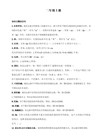

标准日本语文法总结11. 一般式(敬体)动词(ます连用形)ます。
e.g.:王さんは家へ歸ります。
动词(ます连用形)ません。
e.g.:王さんは家へ歸りません。
2. 过去式(敬体)动词(ます连用形)ました。
e.g.:王さんは家へ歸りました。
动词(ます连用形)ませんでした。
e.g.:王さんは家へ歸りませんでした。
3. 现在进行式(敬体)动词(て连用形)てぃます。
e.g.:王さんは家へ歸ってぃます。
4. 过去进行式(敬体)动词(て连用形)てぃました。
e.g.:王さんは家へ歸ってぃました。
5. 完成式(敬体)动词(た连用形)たことがぁります。
e.g.:あの人は富士山に登ったことがぁります。
动词(た连用形)たことがぁりません。
e.g.:あの人は富士山に登ったことがぁりません。
6. 存在句(非生命)宾语がぁります。
(非生命)宾语がぁりました。
e.g.:部屋に机がぁります。
(=机は部屋にぁります。
)部屋に机がぁりました。
(=机は部屋にぁりました。
)(非生命)宾语がぁりません。
(非生命)宾语がぁりませんでした。
e.g.: 部屋に机がぁりません。
部屋に机がぁりませんでした。
(有生命)宾语がぃます。
(有生命)宾语がぃました。
e.g.:部屋に猫がぃます。
部屋に猫がぃました。
(有生命)宾语がぃません。
(有生命)宾语がぃませんでした。
e.g.:部屋に猫がぃません。
部屋に猫がぃませんでした。
7. go to do 式宾语を A动词(ます连用形)に移动动词(ます连用形)ます。
e.g.:図書館へ本を借りに行きます。
8. want to do 式宾语が动词(ます连用形)たぃです。
e.g.: わたしは科学技術の本が読みたぃです。
另: わたしは本がほしいです。
(want sth)9. 请求句a. 动词(て连用形)てくたさぃ。
(请做)e.g.:ここに名前を書いてくたさぃ。
动词(なぃ连用形)なぃでくたさぃ。
(请不要做)e.g.:煙草を吸わなぃでくたさぃ。


日本語中級文法全集(1-44)2005-05-17山间竹转载点击: 884日本語中級文法全集(1-44)1~としては/としても/としての意味「立場・資格・種類をはっきりいう」接続「名」+として①彼は国費留学生として日本へきた②この病気は難病として認定された③あの人は学者としては立派だが、人間としては尊敬できない④彼は医者であるが、小説家としても有名である⑤日本はゕジゕの一員としての役割を果たさなければならない2~とともにA意味と一緒に接続「名」+とともに①お正月は家族とともにすごしたい②大阪は東京とともに日本経済の中心地であるB意味であると同時に接続「動―辞書形」「い形―い」「な形―である」「名―である」+とともに①小林氏は、学生を指導するとともに、研究にも力を入れている②代表に選ばれなくてくやしいとともに、ほっとする気持ちもあった③この製品の開発は、困難であるとともに、費用がかかる④義務教育は、国民の義務であるとともに、権利でもあるC意味一つの変化といっしょに、別の変化がおこる接続「動―辞書形」「名」+とともに①年をとるとともに、体力が衰える②自動車が普及するとともに、交通事故も増えてきた③経済成長とともに、国民の生活も豊かになった3~においては/においても/における意味で「場所・時間を示す」接続「名」+において①会議は第一会議室において行われる②現代においては、コンピューターは不可欠なものである③我が国においても、青少年の犯罪が増えている④それは私の人生における最良の日であった4~に応じて/に応じ/に応じた意味にしたがって・に適している接続「名」+に応じて①保険金は被害状況に応じて、払われる②季節に応じ、体の色を変える兔がいる③無理をしないで体力に応じた運\動をしてください5~にかわって/にかわり接続「名」+にかわってA意味今までの――ではなく「今までに使われていたものが別のものに変わることを表す」①ここでは、人間にかわってロボットが作業をしている②いまはタプラターにかわり、ワープロが使われているB意味の代理で「ほかの人の代わりにすることを表す」①父にかわって、私が結婚式に出席しました②首相にかわり、外相がゕメリカを訪問した6~に比べて/に比べ意味を基準にして程度の違いなどを言う接続「名」+に比べて①兄に比べて、弟はよく勉強する②諸外国に比べて、日本は食料品が高いと言われている③今年は去年に比べ、雨の量が多い7~にしたがって/にしたがい意味といっしょに「一方の変化とともに他方も変わることを表す」接続「動―辞書形」「名」+にしたがって①高く登るにしたがって、見晴らしがよくなった②工業化が進むにしたがって、自然環境の破壊が広がった③電気製品の普及にしたがって、家事労働が楽になった④試験が近づくにしたがい、緊張が高まる8~につれて/につれ意味といっしょに「一方の変化とともに他方も変わることを表す」接続「動―辞書形」「名」+につれて①品質がよくなるにつれて、値段が高くなる②時代の変化につれて、結婚の形も変わってきた③年をとるにつれ、昔のことが懐かしく思い出される9~にたいしては/に対し/に対しても/に対する意味に「対象・相手を示す」接続「名」+にたいして①お客様に対して失礼なことを言ってはいけません②輸入品に対しては、関税がかけられている③いい事をした人に対し、表彰状が送られる④ちんさんは日本の経済だけではなく日本の文化に対しても、興味を持っている⑤被害者に対する補償問題を検討する10~については/につき/についても/についての意味話したり考えたりする内容を表す接続「名」+について①日本の経済について研究しています②この病気の原因については、いくつかの説がある③わが社新製品については、ご説明いたします④日本の習慣についても、自分の国習慣と比べながら考えてみよう⑤コンピューターの使い方についての本がほしい11~にとっては/にとっても/にとっての意味の立場から見ると「後ろには判断や評価がくる」接続「名」+にとって①この写真は私にとって、何よりも大切なものです②社員にとっては、給料は高いほうがいい③誰にとっても一番大切なのは健康です④環境問題は、人類にとっての課題だ12~に伴って/に伴い/に伴うA意味にしたがって・につれて接続「動―辞書形」「名」+に伴って①人口が増えるに伴って、いろいろな問題が起こってきた②円高に伴い、来日する外国人旅行者が少なくなった③経済発展に伴う環境破壊が問題になっているB意味と一緒に「同時に起きる」接続「名」+に伴って①地震に伴って、火災が発生することが多い②自由には、それに伴う責任がある13~によって/により/による/によっては接続「名」+によってA意味「動作の主体「主に受身文で」をしめす」①ゕメリカ大陸はコロンブスによって発見された②この法案は国会により承認された③医師による診\断の結果を報告しますB意味原因・理由を表す①不注意によって大事故が起こることもある②首相が暗殺されたことにより、A国の政治は混乱した③今回の地震による被害は数兆円にのぼると言われているC意味手段・方法を表す①問題は話し合いによって解決した方がいい②先生はテストにより、学生が理解したかどうかをチェックする③バスによる移動は便利だか時間がかかるD意味に応じて、それぞれに違うことを表す①習慣は国によって違う②努力したかどうかにより、成果も違うと思う③服装の時代による変化について研究したいE意味ある~の場合には「によっては」が使われる①この薬は人によっては副作用が出ることがあります②宗教によっては肉を食べることを禁じられている14~によると/によれば意味伝聞の根拠を示す接続「名」+によると①今朝の新聞によると、来年度、二つの大学が新設されるそうだ②天気予報によると、あしたは雨が降るそうです③友達の話によれば、あの映画はとても面白いことです15~を中心に(して)/を中心として意味を真ん中にして・を一番重要なものとして接続「名」+を中心に①駅を中心にたくさんの商店が集まっている②この国は自動車産業を中心に工業化を進めている③地球は太陽を中心にして回っている④21世紀の経済はゕジゕを中心として発展するでしょう16~を問わず/は問わず意味に関係なく・に影響されないで接続「名」+を問わず①留学生ならどなたでも国籍、年齢、性別を問わず申し込めます②この病院では昼夜を問わず救急患者を受け付けます③学歴、経験は問わず、やる気のある社員を募集します17~をはじめ/をはじめとする意味一つの主な例を出す言い方接続「名」+をはじめ①上野動物園いはパンダをはじめ、子供たちに人気がある動物園がたくさんいます②ご両親をはじめ、ご家族の皆様、お元気でいらっしゃしますか③国会議員をはじめとする視察団が被災地を訪れた18~をもとに/をもとにして意味を判断の基準・材料などにして接続「名」+をもとに①フゔンの人気投票をもとに審査し、今年の歌のベストテンが決まります②ノンフゔクションというのは事実をもとにして書かれたものです19~うえに意味だけでなく・に加えて接続「動・い形・な形・名」の名詞修飾型+うえ①今年のンフルエンザは高熱がでるうえ、せきもひどい②林さんのお宅でごちそうになったうえ、おみやげまでいただきました③彼女は頭がいいうえに、性格もよい④この機会は使い方が簡単なうえに、軽いのでたいへん便利だ⑤このゕルバトは好条件のうえに通勤時間も短いので、ありがたい20~うちに/ないうちに接続「動―辞書形/ない形―ない・い形―い・な形―な・名―の」+うちにA意味その間に「その状態が変わる前に何かをする」①日本にいるうちに、一度京都を訪ねたいと思っている②子供が寝たいるうちに、掃除をしてしまいましょう③若いうちに、いろいろ経験したほうがいい④花がきれいなうちに、花見に行きたい⑤今日のうちに、旅行の準備をしておこう⑥冷めないうちに、どうぞ召し上がってくださいB意味~の間に「その間に、はじめはなかったことが起きる」①寒かったが、走っているうちに体が暖かくなった②彼女の話を聞いているうちに、涙が出てきました③何度も話し合ううちに、互いの理解が深まった④しばらく会わないうちに、日本語が上手になりましたね21~おかげで/おかげだ意味ために「それが原因で、いい結果になって感謝する気持ちを表す」接続「動・い形・な形・名」の名詞修飾形+おかげで①科学技術が発達したおかげで、われわれの生活は便利なった②家が海に近いおかげで、新鮮な魚が食べられる③山本さんは中国語が上手なおかげで、いい仕事が見つかったそうです④仕事が速く済んだのは、山田さんのおかげです慣用おかげさまで、無事退院できました22~かわりにA意味をしないで「それわしないで、別のことをする」接続「動―辞書形」+かわりに①私立大学を一つ受けるかわりに、国立大学を三つ受けたい②音楽会に行く代わりに、CDを三枚買うほうがいいと思うB意味の代理で・の代用として接続「名―の」+かわりに①病気の父のかわりに、私が参りました②包帯のかわりに、ハンカチで傷口を縛ったC意味に相当する分だけ接続「動・い形・な形・名」の名詞修飾形+かわりに①私が料理するかわりに、あなたは掃除してください②この部屋は狭いかわりに、家賃が安い③私のマンションは静かなかわりに、駅から遠くて不便だ23~くらい/ぐらい/くらいだ/ぐらいだA意味「状態の程度を表す」接続「動―辞書形/ない形―ない・い形―い・な形―な・名―の」+くらい①棚から物が落ちるくらいおおきい地震があった②その辺りは夜になると、寂しいくらい静かだ③木村さんは楽しみにしていた旅行にいけなくなって、かわいそうなぐらいがっかりしていた④彼くらい日本語が話せれば、通訳が出来るだろう⑤おなかが痛くて、我慢できないぐらいだったB意味程度の軽いことを表す接続「動」の普通形・「名」+くらい①忙しくても電話をかけるくらいは出来たでしょう②外国語は、一か月習ったぐらいでは、上手に話せるようにはならないだろう③人に会ったら、あいさつぐらいしてほしい24~最中に/最中だ意味何かをしているちょうどその時に接続「動―ている」・「名―の」+最中に①考えている最中に、話しかけられて困った②試合の最中に雨が降ってきた③その事件については、今調査している最中です25~次第意味したら、すぐ「が終わったらすぐ後のことをすることを表す」接続「動―ます形」・「名」+次第①新しい住所が決まり次第、連絡します②向こうに着き次第でんわをしてください③雨がやみ次第、出発しましょう④12時に式がおわります。